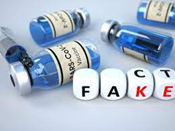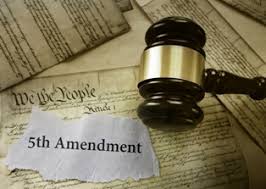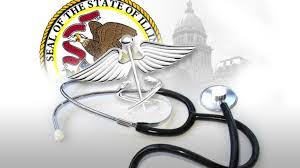 The epidemic continues. It continues to spread unabated. It continues to fill up hospitals and morgues. And if a physician contributes to this epidemic of misinformation and disinformation surrounding COVID-19 vaccines, they could face disciplinary action, including the loss of their license to practice medicine.
The epidemic continues. It continues to spread unabated. It continues to fill up hospitals and morgues. And if a physician contributes to this epidemic of misinformation and disinformation surrounding COVID-19 vaccines, they could face disciplinary action, including the loss of their license to practice medicine.
That is the position of the Federation of State Medical Boards (FSMB), which has come out strongly against the spread of vaccine misinformation among members of the medical profession. It is not a theoretical problem, either. While the internet, school board meetings, and legislatures are full of individuals outside of the profession who spout nonsense about vaccines after “doing their own research,” there are also plenty of doctors, nurses, and other healthcare professionals who have spread false and misleading information about the safety or efficacy of vaccines.
In a statement dated July 29, 2021, FSMB issued a stern warning “in response to a dramatic increase in the dissemination of COVID-19 vaccine misinformation and disinformation by physicians and other health care professionals on social media platforms, online and in the media.”
The federation made clear its opinion that those who spread vaccine misinformation should face disciplinary sanctions:
“Physicians who generate and spread COVID-19 vaccine misinformation or disinformation are risking disciplinary action by state medical boards, including the suspension or revocation of their medical license. Due to their specialized knowledge and training, licensed physicians possess a high degree of public trust and therefore have a powerful platform in society, whether they recognize it or not. They also have an ethical and professional responsibility to practice medicine in the best interests of their patients and must share information that is factual, scientifically grounded and consensus-driven for the betterment of public health. Spreading inaccurate COVID-19 vaccine information contradicts that responsibility, threatens to further erode public trust in the medical profession and puts all patients at risk.”
FSMB has not yet formally defined “misinformation” or “disinformation” in its policy, but its ethics committee plans to provide more guidance at a later date. However, an FSMB spokesman has said that it considers misinformation to be “sharing or distributing verifiably false information” and disinformation as “sharing or distributing information that the distributor knows is false.”
Other professional organizations are backing up the FSMB. On September 9, 2021, the American Board of Family Medicine, the American Board of Internal Medicine, and the American Board of Pediatrics issued a joint statement in which they explicitly endorsed the FSMB’s position, adding that they “want all physicians certified by our Boards to know that such unethical or unprofessional conduct may prompt their respective Board to take action that could put their certification at risk.”
Other groups of physicians and healthcare professionals are joining in the fight against misinformation spread by members of the profession. In a September 21, 2021 Washington Post opinion column, three physicians, including an Illinois endocrinologist, announced the launch of NoLicenseForDisinformation, “a grassroots campaign that aims to ensure that physicians who spread Covid-19 disinformation are held accountable.”
This profession-wide pushback against disinformation should put all medical professionals on notice that their words about COVID vaccines have consequences, not only to the health and well-being of the general public, but to their careers and reputations as well.



 There is no more debate for healthcare workers in Illinois about whether to get vaccinated against COVID-19 (not that there should have been any debate), at least if they want to continue working. On August 26, 2021, Gov. J.B. Pritzker issued
There is no more debate for healthcare workers in Illinois about whether to get vaccinated against COVID-19 (not that there should have been any debate), at least if they want to continue working. On August 26, 2021, Gov. J.B. Pritzker issued  Like many business owners, physicians who own medical practices often require employees, including associate physicians, nurses, and other critical staff members, to sign non-competition and non-solicitation agreements to protect their practice, patients, and personnel. But the ability of medical practice owners to use non-competes and other restrictive covenants in employment contracts will soon be curtailed under a recently passed law that Gov. JB Pritzker is expected to sign.
Like many business owners, physicians who own medical practices often require employees, including associate physicians, nurses, and other critical staff members, to sign non-competition and non-solicitation agreements to protect their practice, patients, and personnel. But the ability of medical practice owners to use non-competes and other restrictive covenants in employment contracts will soon be curtailed under a recently passed law that Gov. JB Pritzker is expected to sign.  Your small business doesn’t provide most of the fuel for the Eastern Seaboard or process and distribute a huge proportion of America’s meat supply. But that doesn’t mean you shouldn’t be worried about ransomware attacks or other cybersecurity threats. The recent attacks on the Colonial Pipeline and meat processor JBS are just two high-profile examples of what has become a significant threat to companies, medical practices, and licensed professionals across a wide range of businesses and professions.
Your small business doesn’t provide most of the fuel for the Eastern Seaboard or process and distribute a huge proportion of America’s meat supply. But that doesn’t mean you shouldn’t be worried about ransomware attacks or other cybersecurity threats. The recent attacks on the Colonial Pipeline and meat processor JBS are just two high-profile examples of what has become a significant threat to companies, medical practices, and licensed professionals across a wide range of businesses and professions.  Bankruptcy happens. It’s not a crime, it’s not a moral failure, it’s not a character flaw. In times of economic upheaval, in particular, even the most hard-working, intelligent, and responsible professionals, from physicians to accountants to hairstylists, can find that their debts have simply become untenable. Filing for bankruptcy can itself be a difficult experience, emotionally, financially, and practically. But if you’re also worried that you might lose your professional license, and thus your ability to support yourself and your family, the anxiety is only compounded.
Bankruptcy happens. It’s not a crime, it’s not a moral failure, it’s not a character flaw. In times of economic upheaval, in particular, even the most hard-working, intelligent, and responsible professionals, from physicians to accountants to hairstylists, can find that their debts have simply become untenable. Filing for bankruptcy can itself be a difficult experience, emotionally, financially, and practically. But if you’re also worried that you might lose your professional license, and thus your ability to support yourself and your family, the anxiety is only compounded. Whether a physician faces disciplinary action by their state medical board depends primarily on their own conduct. Practicing with competence, ethics, and integrity should insulate a doctor from any significant concerns that their license may be put in jeopardy. But it’s not only how you practice, but where you practice, that can determine how likely you are to face the scrutiny of your state’s medical licensing authorities.
Whether a physician faces disciplinary action by their state medical board depends primarily on their own conduct. Practicing with competence, ethics, and integrity should insulate a doctor from any significant concerns that their license may be put in jeopardy. But it’s not only how you practice, but where you practice, that can determine how likely you are to face the scrutiny of your state’s medical licensing authorities. As you know from years of watching TV courtroom dramas or the travails of real-life politicians, people under criminal investigation or who are facing charges often “plead the Fifth” -that is, refuse to provide statements or testimony – because they fear that what they say can and will be used against them in those proceedings.
As you know from years of watching TV courtroom dramas or the travails of real-life politicians, people under criminal investigation or who are facing charges often “plead the Fifth” -that is, refuse to provide statements or testimony – because they fear that what they say can and will be used against them in those proceedings.  Certified Public Accountants have countless ethical responsibilities to their clients. The American Institute of Certified Public Accountants (AICPA)
Certified Public Accountants have countless ethical responsibilities to their clients. The American Institute of Certified Public Accountants (AICPA)  As the COVID-19 pandemic rages on, America’s physicians and health care professionals often face an unnecessary and dangerous choice about what matters more: their career or their mental health.
As the COVID-19 pandemic rages on, America’s physicians and health care professionals often face an unnecessary and dangerous choice about what matters more: their career or their mental health. Simply saying something doesn’t make it so. Just because you believe a proposition doesn’t make it true. And wanting a certain result doesn’t entitle a person to get it. If you are going to advocate for a position or seek an outcome based on claims you make, you better have the receipts to back it up. That is a fundamental proposition of our judicial system. A party seeking relief, whether a plaintiff in a civil lawsuit, a prosecutor in a criminal case, or a defeated president in a flurry of desperate and delusional litigation, must meet the applicable burden of proof to prevail. So too must the Illinois Department of Financial and Professional Regulation (IDFPR) when pursuing disciplinary action against a physician, as does a doctor seeking to have their license reinstated.
Simply saying something doesn’t make it so. Just because you believe a proposition doesn’t make it true. And wanting a certain result doesn’t entitle a person to get it. If you are going to advocate for a position or seek an outcome based on claims you make, you better have the receipts to back it up. That is a fundamental proposition of our judicial system. A party seeking relief, whether a plaintiff in a civil lawsuit, a prosecutor in a criminal case, or a defeated president in a flurry of desperate and delusional litigation, must meet the applicable burden of proof to prevail. So too must the Illinois Department of Financial and Professional Regulation (IDFPR) when pursuing disciplinary action against a physician, as does a doctor seeking to have their license reinstated. 